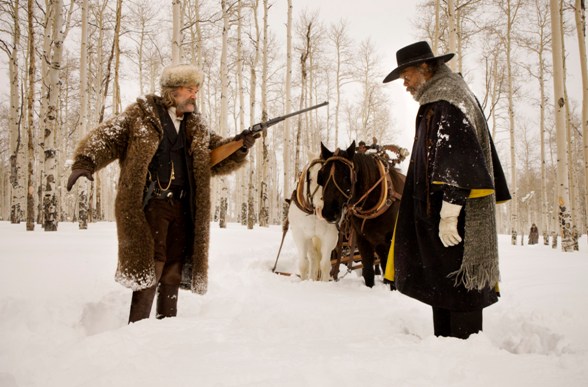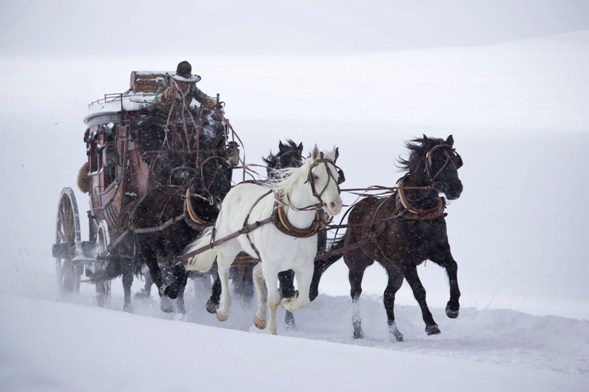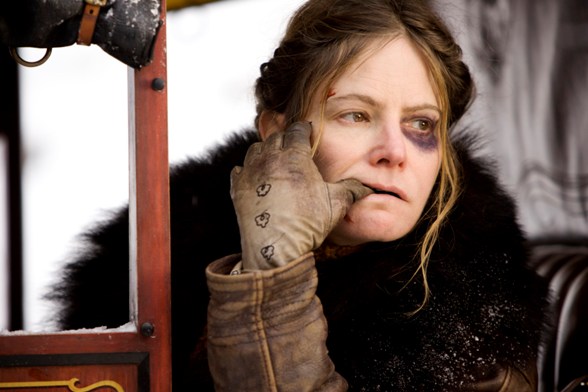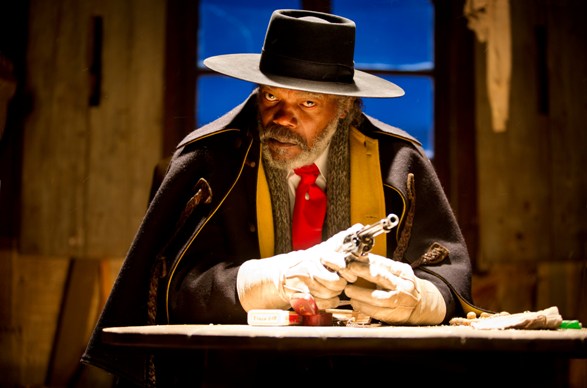
Quentin Tarantino is a masterful storyteller with an appreciation of the aesthetic, and he is, in this writer’s opinion, excessively fond of hyperbole, especially in the visual aspects of film. Too much blood and guts. He’s a director of shock and excess. Much of what transpires onscreen is repugnant to me, and yet he holds me in thrall.
The Hateful Eight is like a tall tale told around the fire in wintertime. Tarantino spins a yarn that for those of us raised on Revisionist Western is classic Western, using just about every trope in the book and using them well, while the Tarantino twist that runs through it establishes a frisson of dissonance throughout. The title announces his intentions and those are fulfilled admirably throughout. The internal theme plays in counterpoint to the action, plumbing the genre for all its worth, giving the viewer an overabundance of gore but withholding the glory. The reflective viewer is left with much to ponder on the issues of revenge, power relationships and alliances, racism and sexism. Yet the film revels in our human capacity for violence, and for me, it was impossible to watch without feeling complicit in that culture of violence.
To compound that complicity, I will say that The Hateful Eight is a powerful and in many ways beautiful film.

The blinding white snow is not only overpowering, it is almost poetic in its complete erasure of everything in its path. A lone stagecoach making its way through the snow, travelers stranded in a storm, Minnie’s Haberdashery the sole inn. The old folktale frame takes on a certain harsh majesty in its visual representation. Man struggling with and against nature, the outer forces and his or his own, inner nature.
Ennio Morricone (The Good The Bad and The Ugly and more – look him up) leads us through this landscape with a score that is ever surprising, and opens the listener to different perspectives. An early scene of the horses galloping in slow motion to ethereal music is a brief interlude of sheer beauty. Tarantino knows how to create tension, and violence becomes ugly when it is juxtaposed with beauty.
The musical score is punctuated at crucial junctures in the plot with song, all placed to sway the viewer’s sensibilities – and they do: The White Stripes’ Apple Blossom, Now You’re All Alone by David Hess, and Roy Orbison’s There Won’t Be Many Coming Home. Yet while those are placed so precisely that one succumbs to their influence (ironic or otherwise) almost without noticing, the Australian folk song Jim Jones at Botany Bay is a show-stopper, sung by Daisy Domergue, outlaw extraordinaire.

What is so extraordinary about this outlaw? She’s a woman, and it’s still rare to see a female villain of this type portrayed onscreen. Female film villains tend more to the subtle and scheming, and while Daisy is a schemer, she is anything but subtle. What makes Daisy truly wonderful is Jennifer Jason Leigh. She is a versatile actor who radiates tensile strength and seductive power, capable of maintaining a duality that inspires revulsion and admiration in the same breath. Even in chains, bloody bruised, Daisy Domergue is never vanquished. She may be evil, manipulative and violent to the core, without a moral bone in her body, and racist to boot, but she is strong, smart, and compels one’s admiration.
Much has been said about the physical violence inflicted on Daisy in this film, leading to accusations of sexism. While the violence is frequent and brutal, it is no more brutal that what is inflicted on men both in this film and others of its genre. Daisy’s crimes and general demeanor are also genre appropriate, it’s just that one is not accustomed to seeing a woman in this kind of role. It is precisely that place of discomfort, the contradiction between society’s norms – how a ‘lady’ ought to behave and how one ought to treat a ‘lady’ – and the situation in which these characters find themselves that creates a terrific tension and dynamic between bounty hunter John Ruth (Kurt Russell) and Daisy.

The entire cast gives excellent performances – most notably Samuel L. Jackson as Major Marquis Warren. Tarantino’s dialogue, clever and ever so articulate, with its tone of archaic formality, is an amused and amusing reminder that this is, after all, a tall tale, a Western-infused mystery, told by a master. It’s an indulgent pleasure, inducing a measure of guilt in the consumption – rather like a sweet cupcake, Red Velvet.*
The Hateful Eight
Directed, written by Quentin Tarantino; Cinematography: Robert Richardson; Editing: Fred Raskin; Music: Ennio Morricone; Cast: Samuel L. Jackson, Kurt Russell, Jennifer Jason Leigh, Walton Goggins, Demian Bichir, Tim Roth, Michael Madsen, Bruce Dern, James Parks, Dana Gourrier, Zoe Bell, Lee Horsley, Gene Jones, Keith Jefferson, Craig Stark, Belinda Owino, Channing Tatum. (English, Spanish dialogue)
*Full and proper disclosure: yes, someone gave me a Red Velvet cupcake during the screening of the film, which I consumed with great delight, and may have affected my overall sense of pleasure, but I still stand by my praise of Quentin Tarantino’s cinematic storytelling abilities.





